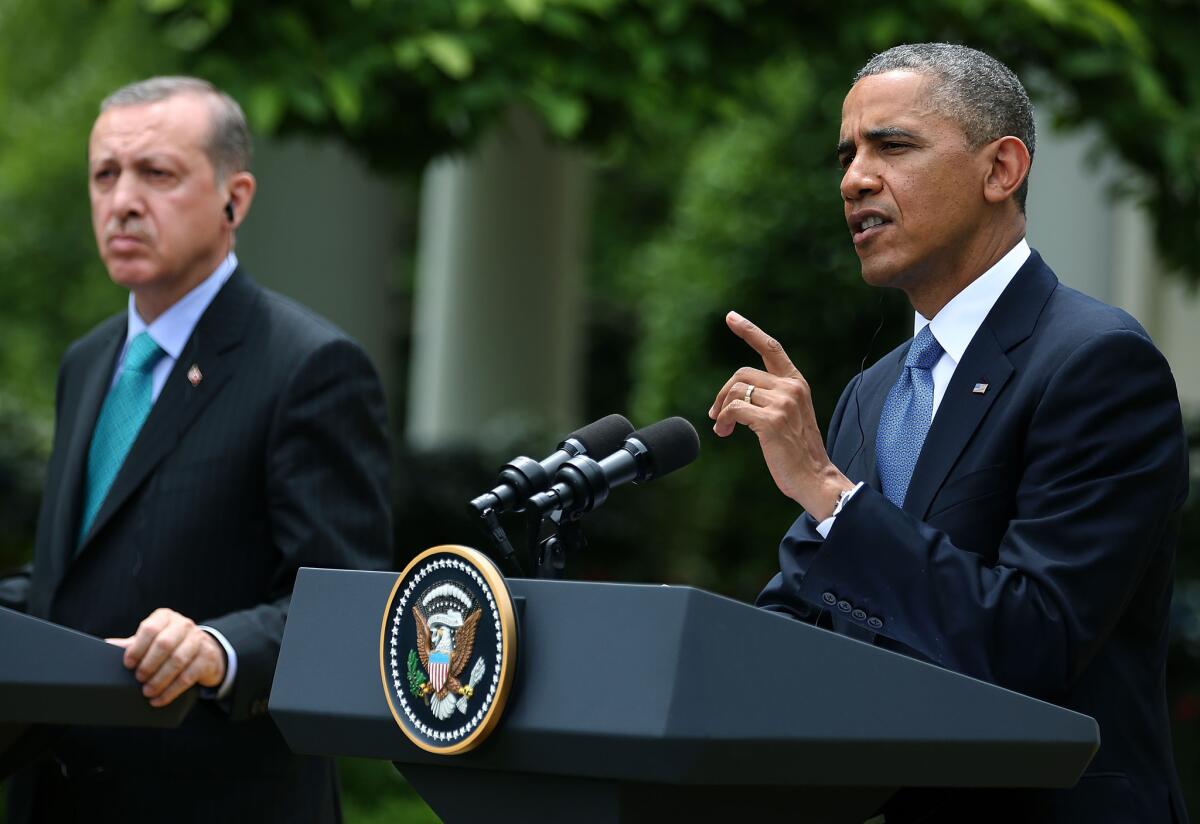Obama says U.S. won’t act alone on chemical weapons in Syria

- Share via
WASHINGTON--President Obama on Thursday ruled out any unilateral U.S action in response to the alleged Syrian use of chemical weapons, further reducing the chance of any forceful response to the crossing of what Obama had described as a “red line.”
At a news conference with Turkish Prime Minister Recep Tayyip Erdogan, the president, responding to a question about how he would react to conclusive evidence that the Assad regime had used such weapons, portrayed the issue as a challenge for world powers collectively, rather than his administration alone.
Obama reiterated his long-standing position that “the use of chemical weapons are something that the civilized world has recognized should be out of bounds.”
“But,” he added, “this is also an international problem, and it’s very much my hope to continue to work with all the various parties involved, including Turkey, to find a solution that brings peace to Syria, stabilizes the region, stabilizes those chemical weapons. But it’s not going to be something that the United States does by itself, and I don’t think anybody in the region, including the prime minister, would think that U.S. unilateral actions, in and of themselves, would bring about a better outcome inside of -- inside of Syria.”
[Updated 12:59 p.m. PDT May 16: Obama’s declarations, beginning last August, that Syria would be crossing a “red line” by using poison gas were interpreted by many to mean that it would trigger U.S. military retaliation.
But as proof has accumulated in recent weeks that deadly sarin gas has been released in Syria, Obama has made clear that he wants conclusive proof that the weapons have been used, and that even then would prefer to have the United States respond as part of a group. But Thursday’s comments were the most definitive statement of his policy.
U.S. and foreign officials have acknowledged that it is likely to be very difficult to find conclusive proof that Syrian government troops used the gas. Even if that is established, it is not clear that an international coalition will agree on a military response, analysts say.]
Obama also hinted that he had rejected Erdogan’s appeal for U.S. military action on Syria. Listing actions the U.S. would take, he said he would increase pressure on the Syrian regime with diplomatic efforts and aid, but notably did not include any military steps. He did, however, suggest that he might consider other options.
Erdogan reaffirmed that he intends to make a controversial visit to the Gaza Strip next month, but said he will also visit the West Bank, as U.S. officials have urged, to check in with the Palestinian Authority, which governs there, as well as the Hamas militant group that runs Gaza.
ALSO:
U.S.-Russia ‘reset’ thwarted by Syrian war, spy scandal
Obama administration to tighten pressure on Iran, aide says
Six Americans among at least 15 killed in Afghanistan bombing
More to Read
Sign up for Essential California
The most important California stories and recommendations in your inbox every morning.
You may occasionally receive promotional content from the Los Angeles Times.














